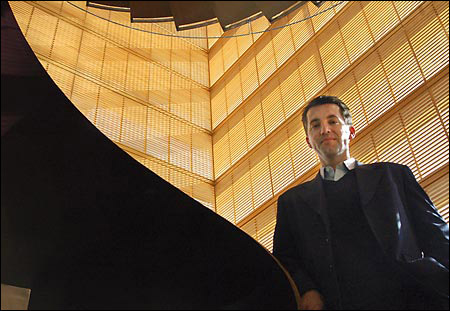Where economics and politics clash
Government professor looks at complex interplay of two worlds

The landscape upon which this drama plays encompasses the two worlds of economics and politics. Observing the complex interplay of these worlds are political economists such as Michael Hiscox.
Hiscox, who was named professor of government in July 2005, is an expert in issues of trade and immigration, and is increasingly focusing on how the individual weighs in on a stage dominated by world governments and giant corporations.
He has examined the impact of political-economic actions like trade sanctions, coming away with the sense that they don’t work as well as their supporters might like them to. The reason they don’t work: politics.
As with any political action, Hiscox said, the adoption of trade sanctions involves the appeasement of various political groups. Trade sanctions on apartheid South Africa, for example, might be supported by minority groups for reasons of social justice, but they might also draw support from a steel industry looking to ban imports of South African steel.
With lawmakers under pressure from a variety of constituencies, a sanction policy that might have maximum economic impact gets changed to meet these political needs. The result, Hiscox said, is that sanctions just don’t work as well as they might.
The same dynamic is in effect for other economic policies, such as trade and immigration. And it is the place where these policies are made, the frothy interface where pure economic logic runs into the buzz saw of political reality, that fascinates Hiscox.
“Economics tells us what the best policy may be, but not why politicians so rarely choose the best policy,” Hiscox said.
Government Department Chair Nancy Rosenblum, the Senator Joseph Clark Professor of Ethics in Politics and Government, said Hiscox’s focus on the domestic political drivers behind economic sanctions is rare in a field that tends to focus on sanctions’ interstate aspects – such as their effectiveness, how to get other nations to cooperate, and how to make them more credible to target nations.
“What makes Hiscox stand out is his beautifully balanced mix of theory and empirical work,” Rosenblum said. “He has a nose for big questions, is extraordinarily inventive in devising measures and compiling data from an amazing array of sources, and has a deep interest in and regard for history.”
Hiscox graduated from the University of Sidney in 1989 and received his doctorate from Harvard in political science in 1997. He was an assistant professor of political science at the University of California, San Diego, from 1997 to 2001. He then returned to Harvard as the John L. Loeb Associate Professor of the Social Sciences, a post he held until being promoted to professor of government last July.
His first book, “International Trade and Political Conflict: Commerce, Coalitions, and Mobility,” published in 2002, received the William H. Riker Prize. His second book, “High Stakes: The Political Economy of U.S. Trade Sanctions, 1950-2000,” is expected to be published sometime this year.
Hiscox’s current research includes a new multinational survey of attitudes toward globalization. The survey, to be tested in the United States before being expanded to other nations, will examine the attitudes of individual voters, as well as business leaders, union officials, and leaders in other sectors of the economy.
The effort, on which Hiscox is working with other members of the Faculty of Arts and Sciences and from the John F. Kennedy School of Government, aims to gather a broad sampling of attitudes toward trade, immigration, and the World Trade Organization – and whether those attitudes translate into concrete action in the voting booth.
He is focusing more narrowly on individuals’ political economic actions, with a test of buying habits at a large European chain store this summer. The project will examine whether labeling goods “fair trade” – signifying they were produced using fair labor standards – makes a difference in people’s buying habits.
The project is an outgrowth of a student’s senior thesis that Hiscox advised. That project examined whether people would pay more for fair-trade goods at an upscale New York home-goods store. It showed that people will buy goods labeled “fair trade” and that, interestingly, they’ll buy even more if the “fair trade” merchandise is more expensive than comparable unlabeled goods.
“There seems to be more potential there than people think,” Hiscox said.
Hiscox credits his dislike of a high school engineering class for his entry into economics. As a high school junior in the small town of Tamworth, Australia, Hiscox said he was looking for a class to fill out his schedule after he dropped engineering. He landed in an economics class that made him scrap his plans to become an architect and set his feet on the path that would lead to Harvard. He credits both the subject matter and the teacher, Patricia Kilborn, who encouraged him to be the first in his family to go to college.
“She likes to claim credit for it, and she should,” Hiscox said of Kilborn, who is retiring this year and who Hiscox returned to visit in September.
Hiscox said that experience makes him aware of how important the teacher-student relationship can be in a student’s life, a fact he keeps in mind when dealing with his own students.
“She was the first one to talk to me about what I’d do in university as if it was going to happen,” Hiscox said. “It makes me really aware of how important encouragement can be.”




